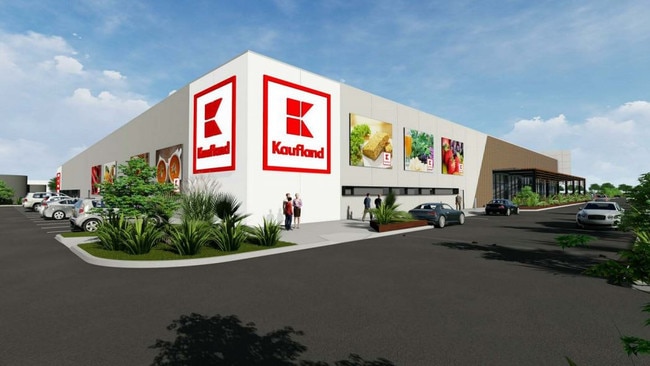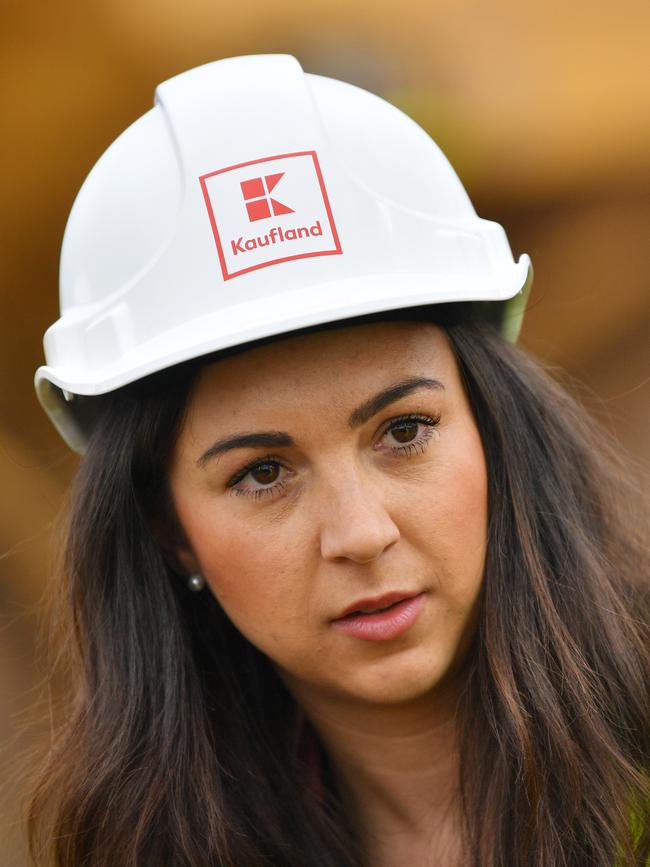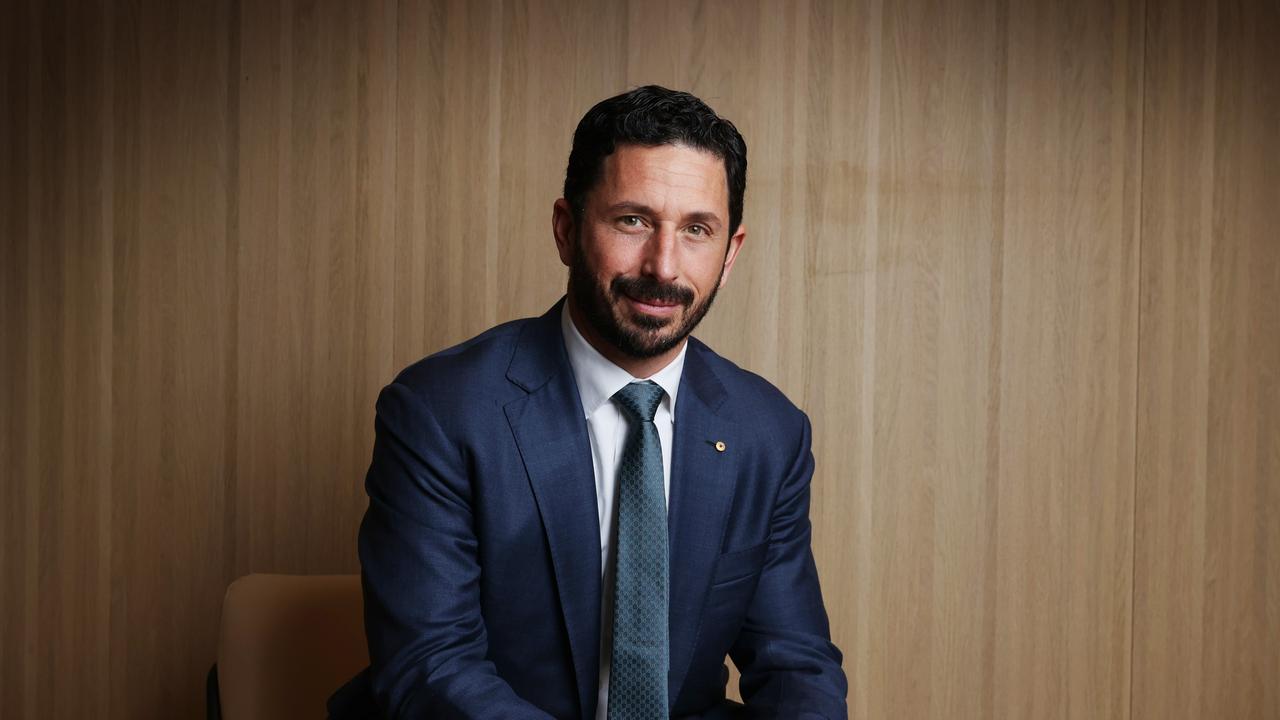200 jobs to go as Germany’s Kaufland dumps Australian supermarket plan
German supermarket discounter Kaufland quits the Australian market before opening a single store.

German supermarket discounter Kaufland has spectacularly quit the Australian market before it opened a single store, eyeing better investment returns from Europe.
The decision to shelve its Australian launch after spending as much as $500m and instead focus on existing operations in Europe will eliminate a looming challenge to the nation’s supermarket chains. Kaufland’s owners, the world’s fourth-biggest retailer, Schwarz Group, had been threatening to kickstart a painful new price war.
About 200 Kaufland Australia employees will lose their jobs. Most were lured to the group from rival supermarkets with the promise of building a business from the ground up.
Shocked Kaufland staff were informed on Wednesday afternoon by their 29-year-old country manager Julia Kern that despite spending hundreds of millions of dollars on properties across Victoria, South Australia, NSW and Queensland over the past three years and signing up thousands of grocery suppliers, Kaufland was dumping its ambitious rollout plans in Australia.
Kaufland had been hiring even in recent days and some retail executives were preparing to quit their current roles to shift to Kaufland before the surprise announcement.
The decision sparked a share surge in listed rivals Woolworths, Coles and Wesfarmers. As recently as December, Kaufland was forging deals with suppliers and even on Wednesday morning - just hours before the shock announcement - suppliers told The Australian that Kaufland buyers were emailing to finalise supply arrangements ahead of planned store openings early next year.
It is understood Ms Kern was told over the weekend in Germany that Kaufland was walking away from Australia, and she flew back from Europe to inform her staff on Wednesday.

Most of the 200 Kaufland Australia employees, including senior executives, were poached from Woolworths and Coles and many had spent six months in Germany on a training course.
The move raises concerns that Kaufland has recently reviewed the Australian economy and retail sector and discovered a worsening retail outlook, driven by deteriorating consumer confidence, anemic economic growth, growing household debt and stagnant wages.
In a statement issued on Wednesday afternoon, Kaufland said that after “careful and thorough consideration” it had decided to undertake an orderly withdrawal from the Australian market.
“The company will be concentrating its business on its European core markets in the foreseeable future,’’ Kaufland said.
Australian Competition & Consumer Commission chairman Rod Sims told The Australian that he was surprised by Kaufland’s exit from the local market and disappointed that a potential competitor had been removed.
“I wasn’t aware of any difficulties they were facing and I hadn’t heard any - none had come up to me - and yes, of course, disappointed when another potential competitor is not there,’’ Mr Sims told The Australian.
Kaufland was due to open its first batch of stores in 2021.
It is believed as recently as a few weeks ago Kaufland signed a new lease for a store at Moorabbin airport in Melbourne’s southeast.
Schwarz had to date pumped almost $500m into its Kaufland Australia subsidiary, engaged in a lengthy planning process with multiple councils to have its more than 20 sites approved, and only in July held a ceremony to mark the sod-turning for its planned $255m distribution centre in northern Melbourne.
Kaufland Australia executives and Ms Kern would not comment on Wednesday night.
Retail analysts were surprised given Kaufland had secured about 23 sites, as well as distribution centres, and made significant progress in signing up suppliers.
Woolworths and Coles were immediate beneficiaries of the news. Shares in Woolworths ended up 3.27 per cent at $41.32 while Coles closed 3.03 per cent higher at $16.62.
Kaufland operates more than 1230 stores in central and eastern Europe including Germany, Poland, the Czech Republic, Romania, Slovakia, Bulgaria, Croatia and Moldova.
Kaufland said its 200 Australian employees had been assured that generous packages including all entitlements would be offered as part of a thorough support and consultation process.
It said the future of Kaufland’s existing Australian investments, including properties purchased for retail outlets and distribution infrastructure, would be discussed with the relevant parties in coming days.
“This decision is about focusing business activities in Europe and is in no way a reflection of the efforts of our local employees or management, or the support Kaufland has received from the Australian business community or governments,’’ the Kaufland statement said.
Frank Schumann, acting CEO of Kaufland International, said: “This was not an easy decision for us. We always felt welcome in Australia. We would like to thank our employees and we apologise for the disruption this decision will cause.
“We would also like to thank our business partners, who offered us great support over the last few years. We would also like to thank the government for being very open-minded to our projects.”
The complete turnaround is in stark contrast to the confidence Kaufland had previously held as it scooped up properties such as a $25m site in Adelaide, and its management appeared in photos with state politicians as it pledged to create thousands of jobs through its retail chains, construction and logistics.
However, in one council submission for the approval for a store in the Mornington Peninsula in Victoria, Kaufland conceded it faced challenges from what it termed “the parochial views of many Australians” as it challenged the major players in the $90bn grocery sector.
“It is unfortunate that some members of the community have reacted to the entrant of a foreign company into the Australian retail market with not only fear but open hostility,’’ the Kaufland submission last year said.
“Submissions like those of the Mount Eliza Community Alliance illustrate one of the greatest difficulties that Kaufland will have in entering the market - the parochial views of many Australians,’’ the submission added. “It demonstrates how important that it will be for Kaufland to provide a point of difference to Woolworths and Coles and to work hard to win over the hearts and minds of Australian shoppers.”





